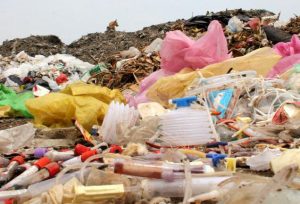What Nurses Need to Know About Medical Waste
 According to a June 2020 article by Practice Greenhealth, a nonprofit organization dedicated to positive environmental stewardship in health care organizations, hospitals produce an average of nearly 30 pounds of waste per person each day. Amid the COVID-19 pandemic, with more disposable personal protective equipment (PPE) being used, waste has increased, the organization notes.
According to a June 2020 article by Practice Greenhealth, a nonprofit organization dedicated to positive environmental stewardship in health care organizations, hospitals produce an average of nearly 30 pounds of waste per person each day. Amid the COVID-19 pandemic, with more disposable personal protective equipment (PPE) being used, waste has increased, the organization notes.
The role of nurses to safely dispose of waste is not just important to their personal safety, but also to the health and safety of patients and the bottom line of health care facilities.
Types of Medical Waste
The World Health Organization (WHO) calls the medical waste generated each day diverse with the potential to be hazardous. Among the types of medical waste the WHO defines on its website are as follows:
- General waste: Non-hazardous materials that do not present any particular hazard.
- Infectious waste: Materials contaminated with blood or bodily fluids and waste from patients with infections.
- Pathological waste: Examples can include human tissues, organs, or fluids.
- Chemical waste: WHO says this can include solvents, disinfectants, and heavy metals contained in medical devices, such as batteries.
- Cytotoxic waste: This type includes hazardous substances that can be carcinogens, such as cytotoxic drugs used in cancer treatment.
- Radioactive waste: According to the University of Pittsburgh’s Radiation Safety Office, this can include contaminated materials or syringes used in nuclear medicine procedures or waste generated from radiation oncology or Positron Emission Tomography (PET) scanning.
- Sharps waste: This category includes syringes, needless, disposable scalpels, and blades.
- Pharmaceutical waste: WHO defines this as “expired, unused, and contaminated drugs and vaccines.”
How Nurses Stay Safe
Along with the WHO, several federal organizations have resources and guidance on how nurses can stay safe on the job. These include:
- The Occupational Safety and Health Administration, known as OSHA, offers safety guidelines in its Bloodborne Pathogens Standard.
- The federal Environmental Protection Agency has published “Model Guidelines for State Medical Waste Management.”
- A state-by-state overview of needle safety legislation can be found on the National Institute for Occupational Safety and Health (NIOSH) website.
- The Centers for Disease Control and Prevention (CDC) offers teaching tools on sharps safety and a guide to design, implement and evaluate an injury prevention program.
- The International Council of Nurses has published a position statement on the role of nurses in regard to medical waste.
Although the federal government does not regulate medical waste, some states do. Nurses also can discover more information by reviewing policies and standards their own facilities have in place.




